CIA Sponsored Terror, Civil Liberties, Civil Rights, FBI Intrusion, U.S. Militarism, Violations of U.S. and International Law, War Resister, Whistleblowers
Podcast: Play in new window | Download
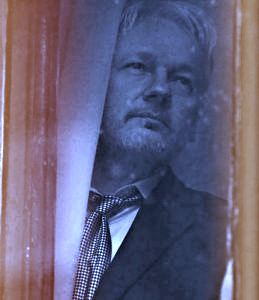
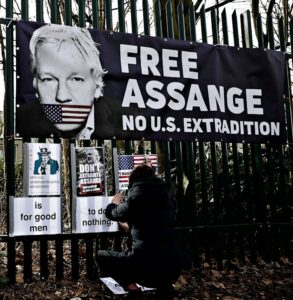
The World Supports Julian Assange
In the past few days, the case of imprisoned journalist Julian Assange, the co-founder of WikiLeaks, who published the truth about the multitude of war crimes committed by United States and its allies, in the course of their wars in Iraq and Afghanistan, was back in court in London, where Assange is fighting extradition back to the United States. He is charged in the U.S. under an obscure section of the 1917 U.S. Espionage Act. As Megan Specia, writing in the New York Times put it, the two-day hearing “will determine whether he has exhausted his right to appeal within the U.K. and whether he could be one step closer to being sent back to the United States.” And she added, “and whether or not the people of the United States are one step closer to losing what is left of a free press in America, and with it what is left of our democracy.”
Assange has been effectively incarcerated for years now, the last five of which in solitary confinement in a notoriously horrid British prison in London, where both his physical and mental health have been steadily deteriorating. Indeed, a lower court judge in his extradition case had ruled against extraditing him because of the strong likelihood he would die in an equally horrid U.S. prison.
A nationwide and world-wide movement to free Julian Assange has been fighting for Assange’s freedom for years now. Virtually all of the world’s leading associations of journalists, and human rights organizations have called for an end to the U.S. government’s prosecution and persecution of Assange. As have major U.S. and foreign newspapers. Assange is an Australian citizen, and the Australian government has called for his release; Australian Prime minister Albanese says he did so when he recently met with President Biden.
Well, why did the Trump Administration decide to prosecute Assange in the first place, and as we now know, at one point plot to murder him? Why did the Obama Administration decide not to continue with the prosecution, and why has the Biden Administration nevertheless continued to do so?
And if Julian Assange loses this his last appeal within the British courts, does he have any remaining legal remedy?
Guest – Chris Hedges, award-winning journalist and political writer. Chris Hedges reported for The New York Times from 1990 to 2005 and served as the Times’ Middle East Bureau Chief and Balkan Bureau Chief during the wars in the former Yugoslavia. In 2001 Hedges was one of the Times’ writers on an entry that received the 2002 Pulitzer Prize for Explanatory Reporting. Prior to his work for the Times, he worked as a freelance war correspondent in Central America for the Christian Science Monitor, NPR and the Dallas Morning News. His books include “Death of the Liberal Class”, “War on America”, “Days of Destruction, Days of Revolt”, and his book “War Is a Force That Gives US Meaning”, which was a finalist for the national Book Critics Circle Award for Non-Fiction.
—-
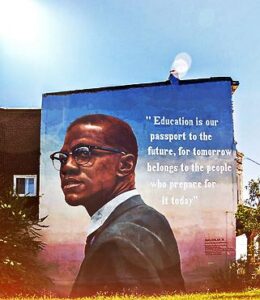
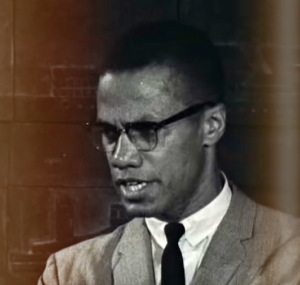
Flint Taylor Representing Malcom X’s Family In Reinvestigation Case
An assassination is a political murder. Malcolm X was assassinated on February 22, 1965 when he was speaking in the afternoon at the Audubon Ballroom in New York City. The New York Police Department and the FBI were involved. J. Edgar Hoover, the Director of the FBI, said “. . . we must stop the rise of a new black messiah.”
Days before the murder the NYPD arrested two of Malcolm’s bodyguards who would’ve protected him that afternoon. Two of the men who were convicted of the murder and who each served over 20 years in prison have been exonerated and released. One person, the trigger man, was convicted and served 45 years. But others involved have gone free as a result of withholding information by the police and the FBI.
Civil rights lawyer Ben Crump, who represented the family of George Floyd, has been retained by Malcolm X’s daughters to pursue the matter. On his team are attorneys Flint Taylor, Ben Elson, and Roy Hamlin. The function of the FBI and police departments nationwide is to protect the status quo. Hoover and the NYPD recognized the threat Malcolm posed with his newly formed Organization of African -American Unity.
Malcolm X was rapidly evolving into a socialist revolutionary. He had said with respect to the capitalist order that it could not produce social justice, that a chicken cannot lay a duck egg and if it ever did, it would be a pretty revolutionary chicken. Malcolm was killed on February 22, 1965. The FBI had opened a file on him in 1953. Thereafter he was under constant surveillance. In 1964 the head of the FBI, J. Edgar Hoover, commanded “do something about Malcolm X.“ Malcolm was assassinated the next year.
Malcolm X stood for Black consciousness, unity in action, solidarity with those struggling against imperialism worldwide, independence from the two capitalist political parties, and a deep sense of love for people.
Guest – Flint Taylor of the Peoples Law Office. Taylor is a nationally recognized civil rights attorney. He represented the family of Fred Hampton demonstrating that the Chicago Police Department and the FBI were responsible for the assassination of the young Black Panther leader. He’s written the book “The Killing Machine: Racism and Police Violence in Chicago”. He is one of the editors of the “Police Misconduct Law Reporter. He’s the author of The Torture Machine: Racism And Police Violence In Chicago.
Hosted by attorneys Michael Smith, Maria Hall and Jim Lafferty

——————————–
Civil Liberties, Civil Rights, Human Rights, Targeting Muslims, U.S. Militarism, Violations of U.S. and International Law, War Resister
Podcast: Play in new window | Download

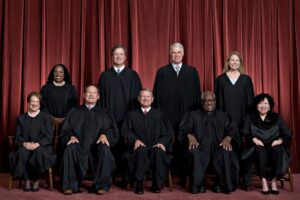
Disqualification Clause In Trump v. Anderson
On February 8, the Supreme Court heard oral arguments in Trump v. Anderson. The Colorado Supreme Court had held that Donald Trump’s participation in the January 6 insurrection makes him ineligible to be president, under the Disqualification Clause in Section 3 of the 14th Amendment to the Constitution. At issue is whether the Colorado court erred in holding that Donald Trump is disqualified from the office of the presidency.
During the arguments, with the exception of Sonia Sotomayor, all of the members of the Supreme Court – many of whom identify as originalists — signaled that they are prepared to ignore the command of the Disqualification Clause and refuse to allow Colorado to exclude Trump from the ballot.
Section 3 was enacted by Congress in the wake of the Civil War to disqualify people from holding office who had served in government prior to the war, but then supported the Confederacy. Nevertheless, during the Trump v. Anderson oral arguments, the Supreme Court members all but ignored the January 6 insurrection, the greatest threat to the survival of the Republic since the Civil War.
Guest – Marjorie Cohn is Professor of Law Emerita at Thomas Jefferson School of Law and former president of the National Lawyers Guild. Marjorie is also Dean of the People’s Academy of International Law and a member of the Bureau of the International Association of Democratic Lawyers. She writes frequent articles about the Supreme Court for Truthout.
—-
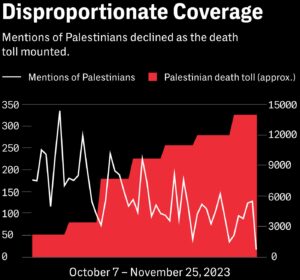

Pro-Israel Media Bias in US Newspapers
Analysis of the coverage of Israel’s war on Gaza by three major newspapers—The New York Times, Washington Post, and Los Angeles Times—reveals consistent bias against Palestinians, according to a recent report by the Intercept. The analysis, which examined more than 1,000 articles from these publications during the first six weeks of Israel’s assault, focused on usage of key terms and their contextual framing.
The study uncovered significant disparities in the reporting of casualties and the emotional language used. Terms like “slaughter” and “massacre” were disproportionately applied when describing the killing of Israelis compared to Palestinians. For instance, editors and reporters used the word “slaughter” 60 times to describe the killing of Israelis, but only used it once when referring to Palestinians. The word “massacre” was used 125 times to describe the killing of Israelis but only used twice for Palestinians. The term “horrific” was used 36 times in the context of Israeli casualties compared to just 4 times for Palestinians.
Despite the fact that Israel’s genocide in Gaza has caused an unprecedented loss of life among children—with more than 10,000 reported fatalities as of the present—only two headlines out of more than 1,100 news articles in the study mentioned the word “children” in connection with Gazan victims. Similarly, the plight of journalists, with more than 100 Palestinian reporters killed due to the Israeli bombardment, received scant attention. The word “journalists” and its iterations, such as “reporters” and “photojournalists,” appeared in only 9 headlines in over 1,100 articles.
Guest – Mischa Geracoulis is a journalist and critical media literacy expert. Mischa is the Curriculum Development Coordinator at Project Censored, and serves on the editorial board of the Censored Press and The Markaz Review. She writes about journalistic ethics and standards, press and academic freedoms, identity and culture, and the protracted disinformation campaign against the Armenian Genocide.
Hosted by attorneys Heidi Boghosian and Marjorie Cohn.

—————————————
Civil Liberties, Civil Rights, Gaza, genocide, Human Rights, Targeting Muslims, U.S. Militarism, Violations of U.S. and International Law, War Resister
Podcast: Play in new window | Download

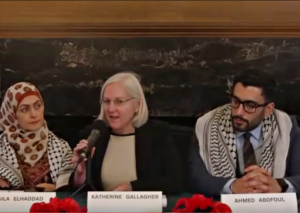
Unflagging Support For The Military Siege Against Palestinians In Gaza
Several months ago, various Palestinian human rights groups and individuals in Gaza and in the U.S., filed a lawsuit in a U.S. federal court, against President Biden, Secretary of State Blinken, and Secretary of Defense Austin, for their failure to prevent, and their complicity in, the Israeli government’s unfolding genocide against them, their families, and the 2.2 million Palestinians living in Gaza. They were represented by the attorneys at the famed Center for Constitutional Rights in New York City.
After a hearing that included testimony from seven Palestinian plaintiffs and witnesses as to the scale of destruction in Gaza and its impact on them and their families, the court found that Israel’s assault and siege on the Palestinian people in Gaza did, “plausibly” constitute genocide, and the court “implored” the Biden Administration to examine its “unflagging support” for Israel. This constituted a profoundly important finding. But the court nevertheless dismissed the case on the grounds that it lacked jurisdiction over the administration’s conduct of foreign affairs.
What was the testimony of the plaintiffs in this case? What were the legal arguments put forth by their attorneys? Why did the court rule as it did? And what is the significance of the judge’s finding that it was “plausible” that genocide was, indeed, taking place in Gaza and its urging of the Biden Administration to examine what the judge termed, its “unflagging support” for Israel in its war on the Palestinian people? CCR Case
Guest – Attorney Katherine Gallagher is a Senior Staff Attorney at the Center for Constitutional Rights . Her areas of legal expertise include matters of torture, war crimes and militarism. Among her many major cases is the case titled, Situation of Afghanistan at the International Criminal Court; and the case titled, Survivors Network of those Abused by Priests-v-Vatican. Prior to her work at the CCR, she worked at the United Nations International Criminal Tribunal for the former Yugoslavia. She is a visiting professor of law at the City University of New York (CUNY) School of Law.
—-
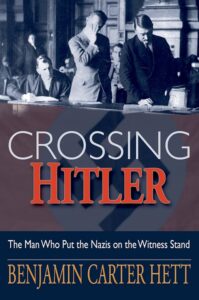


2024 Could Be The Year America Fends Off Dictatorship Or Invites It In
Some years ago, Michael Ratner, the president of the Center For Constitutional Rights and a co-founder of Law And Disorder interviewed our returning guest attorney Benjamin Carter Hett. Hett is a historian, a professor at Hunter College and a lawyer. He wrote a stellar biography of the great German leftist attorney Hans Litten, who cross-examined Hitler, almost stopping him from coming to power by exposing Hitler’s hypocrisy on using violence.
As Michael wrote about professor Hett’s book “it brings to life the period preceding the takeover of Germany by the Nazis. Litten’s cross examination of Hitler went to the heart of the Nazis attempt to achieve power through violence.” Trump has promised to do the same should he get elected. Professor Hett recently wrote about this in an opinion piece in the Los Angeles Times. In an interview with Fox News host Sean Hannity Trump said he wanted to be a dictator “on the first day” of his new administration.
It has been reported that Trump would invoke the Insurrection Act which would allow him to deploy troops to crush protests, arrest dissidents, and shut down oppositional media. Trump is a fascist. He’s not an advocate of the rule of law or of democracy. He boasts about using violence. In the divorce papers his first wife Ivana Trump filed against him she alleged that he kept a book of Hitler’s speeches at his bed table.
Like Hitler, Trump appeals to his base and their desire for “retribution.” Trump said “we pledge to you that we will root out the Communist and radical left thugs that live like vermin within the confines of our country.” Hitler’s racism was shown by his antisemitism, Trump’s by his hatred of immigrants who he says, echoing Hitler, “will poison” American blood.
Guest – Benjamin Carter Hett is a former trial lawyer. He is now a professor of history at Hunter College and the author of several books, including Crossing Hitler: The Man Who Put The Nazis On The Witness Stand. Most recently he has written an opinion piece in the Los Angeles Times titled 2024 Could Be The Year America Fends Off Dictatorship Or Invites It In.
Hosted by Attorneys Michael Smith and Jim Lafferty

————————————–
Civil Liberties, Civil Rights, Gaza, genocide, Human Rights, Targeting Muslims, Violations of U.S. and International Law
Podcast: Play in new window | Download
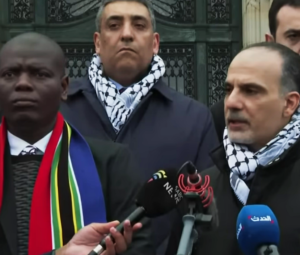
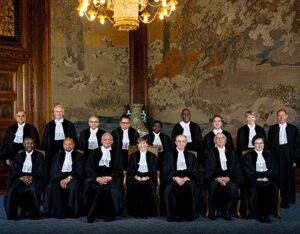
South Africa Brings Israel To World Court
On January 11 and 12, South Africa and Israel appeared in a historic case before the International Court of Justice (ICJ), also known as the World Court, in The Hague. South Africa’s legal team made a strong and persuasive argument that Israel is engaging in genocide against the Palestinian people in Gaza. South Africa asked the court to impose nine emergency “provisional measures” aimed at putting an end to the slaughter.
South Africa’s application to the ICJ places Israel’s genocidal acts and omissions in the broader context of Israel’s 75-year apartheid policy, 56-year occupation, and 16-year blockade imposed on the Gaza Strip. This siege was described by the Director of UNRWA Affairs in Gaza as “a silent killer of people.”
South Africa told the court that it “unequivocally condemned the targeting of civilians by Hamas and other Palestinian armed groups and the taking of hostages on 7 October.” But, it continued, “no armed attack on a State’s territory no matter how serious — even an attack involving atrocity crimes — can provide any justification for, or defence to” genocide. Israel “has crossed this line.”
Israel responded by placing responsibility on Hamas for the situation in Gaza. It accused South Africa of an “attempt to weaponize the term genocide.” Israel argued that international humanitarian law is the relevant framework — that Hamas committed war crimes. In Israel’s view, this is not a genocide case; if anyone was the victim of genocide, Israel claims IT was on October 7 when Palestinian resistance forces killed what Israel claims were 1,200 people. However, Hamas is not part of this case, because it is not a state party to the Genocide Convention.
Guest – co-host Marjorie Cohn is Dean of the People’s Academy of International Law and a member of the Bureau of the International Association of Democratic Lawyers. Marjorie is also professor of law emerita at Thomas Jefferson School of Law and former president of the National Lawyers Guild. She writes prolifically about Israel’s occupation of Palestinian territory and Israel’s violations of the human rights of the Palestinian people.
—-
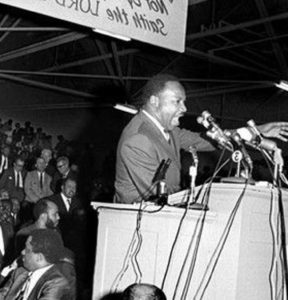
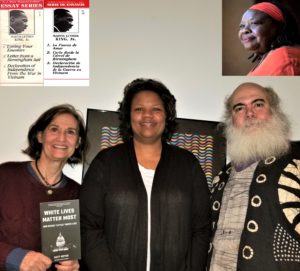
Honoring the Legacy Of Dr. Martin Luther King Jr.
We hear part of an hour long program honoring the life and legacy of the Rev. Dr.Martin Luther King. Our listeners know all too well that the Nobel Peace Prize laureate was shot on April 4, 1968. Not so well known is the radical Dr. King, who said in the last months of his life that:
“Our only hope today lies in our ability to recapture the revolutionary spirit and go out into a sometimes hostile world, declaring eternal hostility to poverty, racism, and militarism. With this powerful commitment we shall boldly challenge the status quo.”
Joining us are special guests Ruby Sales, a colleague of Dr. King’s and co-founder of the Student Nonviolent Coordinating Committee; and Rev. Dr. Emma Jordan-Simpson, Executive Director of the Fellowship of Reconciliation (F.O.R.). We’re also joined by author and activist Matt Meyer, a board member of the AJMI.
Dr. King began close ties with A.J. Muste and with the F.O.R. during the Montgomery bus boycott, when FOR staff members Bayard Rustin and Glenn Smiley came to Alabama to support local efforts nonviolently challenging racial segregation. Dr. King developed a special relationship with former FOR chairman A.J. Muste, whose absolute pacifism King had, as a theological seminary student, questioned.
Before heading F.O.R., Muste was a prominent labor leader, helping to found the militant Congress of Industrial Organizations (CIO). And Dr. King, of course, was killed exactly one year after taking a staunch anti-Vietnam war position and in the midst of supporting a significant strike of sanitation workers, linking—as he had been—issues of race, class, and violence as King deepened his critique of the roots of oppressive U.S. society.
Guest – Ruby Sales is the founder and director of the “SpiritHouse Project”, a national organization that uses the arts, research, education, action and spirituality to bring diverse peoples together to work for racial, economic and social justice as well as for spiritual maturity. A life-long organizer, scholar and public theologian in the areas of civil, gender and other human rights, she was a member of the Student Non-violent Coordinating Committee and served as national convener of the Make Every Church A Peace Church movement.
Guest – Rev. Dr. Emma Jordan-Simpson is the Executive Pastor of The Concord Baptist Church of Christ, Brooklyn, NY. She has combined pastoral ministry with the social justice community. The former Executive Director of the Children’s Defense Fund she is now the Executive Director of the Fellowship of Reconciliation.
Guest – Matt Meyer is Secretary-General of the International Peace Research Association, Chair of the International Fellowship of Reconciliation’s Financial Advisory Committee, Africa Support Network Coordinator of the War Resisters International, and Senior Research Scholar at U-Mass Amherst. As current National co-chair of FOR and former Chair of the War Resisters League, he is second only to AJ Muste in holding the top post of those two historic US peace organizations. He is author of the recently published White Lives Matter Most And Other “Little” White Lies.
Hosted by attorneys Heidi Boghosian and Marjorie Cohn (also as guest)

———————————–
Civil Liberties, Human Rights, Targeting Muslims, Violations of U.S. and International Law, War Resister
Podcast: Play in new window | Download


Human Rights Lawyer Says UN Failed To Protect Palestinians
The Israeli air and ground war against 2.3 million Palestinians imprisoned in the Gaza Strip is in its is 98th day. Ralph Nader stated on Democracy Now that the reported 23,000 deaths of Palestinians is vastly understated. He estimated a true count to be around 100,000. Moreover, he projected, that because of disease and starvation 500,000 people in Gaza will likely die this year.
International human rights lawyer Craig Mokhiber resigned from the United Nations on October 28, 2023.
He had worked for the UN for more than three decades, and was the director of its human rights agency in New York. In his resignation letter he wrote that the UN had failed in its duty to protect Palestinians. Mokhiber accused the US, the UK, and much of Europe, of being “wholly complicit in the horrific assault” in Gaza.
Last week South Africa filed a lawsuit against the government of Israel in the International Court of Justice for the crime of genocide. The ICJ is the court of the United Nations. John Kirby, a spokesperson for the United States, called the lawsuit “counterproductive, without any basis in fact, whatsoever“.
Guest – Attorney Craig Mokhiber, graduated from the University of Buffalo Law School and has lived in the Gaza Strip. Mr. Craig Mokhiber is a Director in the New York Office of the High Commissioner for Human Rights (OHCHR). A lawyer and specialist in international human rights law, policy and methodology, he has served the UN since 1992. As chief of the Human Rights and Development Team in the 1990s, he led the development of OHCHR’s original work on human rights-based approaches to development and human rights-sensitive definitions of poverty.
—
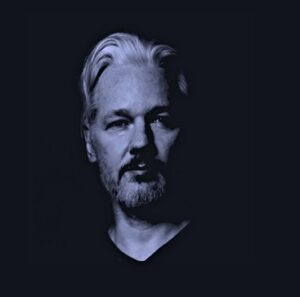

CIA Operations Subject To Discovery In Assange Attorneys’ Spying Case
On December 19th, a federal court in New York rendered a decision of profound importance, having to do with claims of illegal actions by the CIA, and others, brought by attorneys representing the world-renowned journalist and founder of WikiLeaks, Julian Assange. Assange is currently imprisoned in London awaiting a final ruling in the U.S. government’s efforts to extradite him back to the United States and stand trial for violations of the Espionage Act of 1917, for having published documents exposing U.S. war crimes in connection with America’s wars in the Middle East. In their lawsuit against the CIA, former CIA head Mike Pompeo, and others, Assange’s attorneys alleged that the CIA violated the attorneys’ constitutional rights by subjecting them to illegal surveillance during their visits with Assange while he was staying in the Ecuadorian Embassy in London, where he had been granted asylum.
While the other claims of the attorneys were dismissed by the court, the CIA was not dismissed from the lawsuit. And so, the plaintiffs have won a rare opportunity for the clandestine operations of the CIA, which prides itself on secrecy, to now be subjected to public scrutiny and accountability through discovery actions in connection with the plaintiff’s claims.
The importance, the significance of this victory against the CIA cannot be overstated. And to help us understand how this victory came to pass, what the alleged abuses of the CIA were that led the judge to deny the attempt of the CIA to be dismissed from the lawsuit.
Guest – Vincent de Stefano, the chief organizer for the National Defense Committee for Julian Assange. Mr. De Stefano is a life-long social justice activist and a founding member of the Southern California Assange Defense Committee, as well as an Executive Board member of the national Assange defense committee. He is the former President of the Pasadena/Foothills Chapter of the ACLU and a board member of the Southern California ACLU Affiliate. Vince De Stefano has worked with Amnesty International for over 4 decades, and in 2019 was recognized by Amnesty as their Urgent Letter Writer of the Year.
Hosted by Attorneys Michael Smith, Maria Hall and Jim Lafferty

———————————————-
Civil Liberties, Civil Rights, Human Rights, U.S. Militarism, Violations of U.S. and International Law, War Resister, Whistleblowers
Podcast: Play in new window | Download


Israel Is Terrified The World Court Will Decide Its Committing Genocide
Since Hamas killed 1,200 Israelis on October 7, Israel has launched a full-scale genocide against the Palestinian people in Gaza. As of this broadcast, Israeli forces have killed at least 22,100 Gazans, about 9,100 of whom are children. At least 57,000 persons have been wounded and at least 7,000 are reported missing. Untold numbers of people are trapped beneath the rubble. Israel has expelled and forcibly displaced more than 85% of Gaza’s population from their homes, and has cut off their access to food, water, fuel and electricity.
Although the International Criminal Court (ICC) has been investigating what it refers to as the “Situation in the State of Palestine” for nearly three years, calls for prosecution of Israeli officials have been ignored. This blind eye comes as the chief prosecutor of the ICC demonstrates blatant bias in favor of Israel.
The ICC’s Rome Statute provides for the prosecution of individuals who commit, or aid and abet the commission of genocide. By contrast, the International Court of Justice (ICJ or “World Court”) — the judicial arm of the UN system — resolves disputes between countries.All the 153 countries that have ratified the 1948 Genocide Convention have a duty to prevent and punish genocide and they can submit the issue of Israel’s genocide to the ICJ.
On December 29, South Africa launched a well-documented case at the ICJ, alleging that Israel’s military campaign in Gaza amounts to genocide. South Africa is asking the court to order provisional measures to “protect against further, severe and irreparable harm to the rights of the Palestinian people under the Genocide Convention.” It also asks the court “to ensure Israel’s compliance with its obligations under the Genocide Convention not to engage in genocide, and to prevent and to punish genocide.”
A hearing in the ICJ on South Africa’s application is scheduled for January 11 and 12. Other parties to the Genocide Convention are being approached to join South Africa’s petition.
Marjorie’s recent article : Israel Is Terrified The World Court Will Decide Its Committing Genocide
Guest – Marjorie Cohn – Law and Disorder co-host Marjorie Cohn, who is Dean of the People’s Academy of International Law and a member of the Bureau of the International Association of Democratic Lawyers. She is Professor of Law Emerita at Thomas Jefferson School of Law and former president of the National Lawyers Guild and she has written extensively about the Israeli genocide in Gaza for Truthout.
—-
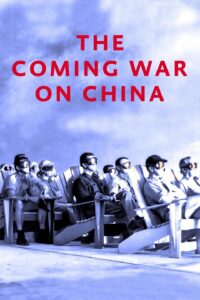

Remembering Australian Journalist John Pilger
Today we re-broadcast a recent interview we did with the great Australian journalist John Pilger about his film titled The Coming War On China. With the exception of a short break at the conclusion in 1975 of the Vietnamese war, the United States has been at war continually. The momentum of what President Eisenhower warned us against and described as being led by, “the military industrial complex” has been going on with successive wars against Afghanistan, Iraq, Libya and now the American proxy war in Ukraine. The military industrial complex has been augmented by support from the CIA, Congress, and the corporate media.
As Pilger demonstrates, the United States, is building up for a war against China. This build up is both military and ideological and shaped by hostile propaganda. In this respect, an alarming full page New York Times article, 11 weeks in the making, and written by seven reporters, appeared on August 5, 2023. The article targeted the American peace organization CODEPINK as well as one of its financial backers. It is a hit piece that has alarmed many of us in the movement. John Pilger gives us the background to it.
Guest – John Pilger covered that war as a young reporter and understood that it was based on the lie that Lyndon Johnson told falsely stating that the North Vietnamese had attacked an American ship in the Gulf of Tonkin. Another 1 million people died in the Iraq war That war was based on the now well known lie that Saddam Hussein had weapons of mass destruction that he was going to use against us and that he was responsible for 911. A similar campaign of fear mongering is going on now about China. The major news media parrot the government’s fact free line that China is our enemy. In his article “The Coming War With China” John Pilger wrote “a US war against China beckons and we have a responsibility to speak out. We know what is coming. Silence must be broken.”
Hosted by attorneys Michael Smith, Maria Hall, Heidi Boghosian and Marjorie Cohn

—————————————-

























